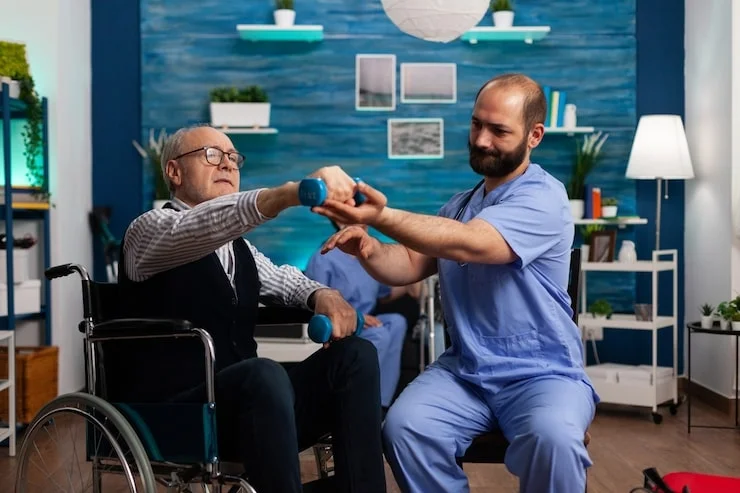Understanding Rehabilitation
Rehabilitation is a comprehensive process that helps individuals restore physical, mental, and emotional health after illness, injury, or addiction. It is not just about treatment but about rebuilding lives. Rehabilitation focuses on enabling people to regain independence, confidence, and functionality so they can return to their daily routines. Through a mix of therapy, counseling, and medical support, it helps improve overall wellbeing and quality of life.
Types of Rehabilitation Programs
There are several types of rehabilitation programs designed to meet different needs. Physical rehabilitation supports recovery from injuries, surgeries, or chronic pain, helping patients regain strength and mobility. Mental health rehabilitation focuses on emotional and psychological healing for those facing anxiety, depression, or trauma. Addiction rehabilitation, on the other hand, offers structured support to individuals struggling with substance abuse or behavioral addictions, providing tools for long-term recovery.
The Importance of Rehabilitation in Health
Rehabilitation plays a vital role in healthcare because it bridges the gap between illness and full recovery. Many people experience challenges even after completing medical treatments. Rehabilitation ensures continuity of care and prevents relapses. It emphasizes holistic healing, targeting both body and mind, which helps patients live a productive and fulfilling life. Without proper rehabilitation, recovery often remains incomplete or temporary.
How Rehabilitation Works
Rehabilitation begins with assessment and personalized planning. Professionals such as physiotherapists, psychologists, and counselors evaluate the patient’s condition and create an individualized program. The process usually includes physical exercises, therapy sessions, and lifestyle modifications. Patients are guided to set realistic goals and track progress over time. Rehabilitation works best when it combines consistent medical support with motivation and family involvement.
Rehabilitation for Physical Recovery
Physical rehabilitation helps restore movement, coordination, and strength after injuries or surgeries. It is essential for individuals recovering from fractures, strokes, or chronic pain conditions. Therapists use targeted exercises, massage therapy, and mobility training to enhance flexibility and endurance. Over time, patients experience reduced pain and better physical performance. Physical rehabilitation also educates patients on posture, balance, and preventive care to avoid future injuries.
Rehabilitation for Mental Health
Mental health rehabilitation focuses on emotional stability and personal growth. It provides a safe space for people dealing with conditions such as anxiety, depression, or bipolar disorder. Therapy sessions, counseling, and mindfulness practices help manage negative thoughts and improve coping mechanisms. The aim is not only to reduce symptoms but also to help individuals rebuild self-esteem and social connections. Mental health rehabilitation promotes lasting emotional wellness and resilience.
Addiction Rehabilitation and Recovery
Addiction rehabilitation is one of the most transformative types of care. It provides structured programs for individuals battling alcohol, drug, or behavioral addictions. Rehabilitation centers offer medical detox, therapy, and relapse prevention strategies to help patients regain control of their lives. The journey of addiction rehabilitation involves both emotional and physical healing. Through guidance, support groups, and behavioral therapy, individuals learn to replace destructive habits with healthy choices.
The Role of Family in Rehabilitation
Family plays a crucial role in the rehabilitation journey. Emotional support from loved ones helps patients stay motivated and positive. Families are often involved in therapy sessions to understand how to assist in recovery and create a supportive home environment. Their encouragement can significantly impact progress, especially for those facing addiction or mental health challenges. A strong support system ensures continuity of care beyond the rehabilitation center.
Rehabilitation Centers and Professional Care
Rehabilitation centers provide a structured and safe environment for recovery. These centers employ multidisciplinary teams including doctors, therapists, and counselors who collaborate to deliver personalized care. In Pakistan, especially in cities like Faisalabad, many rehabilitation centers now offer specialized services for both physical and mental health recovery. Their facilities are designed to promote comfort, healing, and long-term results. Professional guidance ensures that patients receive consistent support throughout their journey.
Benefits of Rehabilitation
The benefits of rehabilitation are wide-ranging. It helps improve physical strength, emotional stability, and cognitive function. Patients experience reduced dependency on medication and develop better coping skills. Rehabilitation also prevents relapses, enabling individuals to maintain healthy routines. Most importantly, it restores confidence and independence. Whether recovering from an injury or addiction, rehabilitation empowers people to rebuild their lives with renewed purpose.
Challenges During Rehabilitation
While rehabilitation is highly effective, it can be challenging. Some patients struggle with consistency or motivation, while others face emotional or financial barriers. However, with proper guidance and a positive mindset, these challenges can be overcome. Support from professionals and family members makes the process smoother. It is important to understand that rehabilitation takes time, and progress happens step by step. Patience and persistence are key to achieving long-term success.
Rehabilitation in Faisalabad and Pakistan
In recent years, rehabilitation services in Pakistan have grown significantly. Cities like Faisalabad now have modern centers equipped with trained professionals and advanced treatment methods. These centers provide physical, mental, and addiction rehabilitation under one roof. Awareness about mental health and recovery has also increased, encouraging more people to seek help. Rehabilitation in Faisalabad combines traditional care with modern techniques, offering comprehensive solutions for lasting recovery.
Conclusion: A Journey to a Better Life
Rehabilitation is more than a treatment—it’s a journey toward self-restoration and growth. Whether someone is healing from an injury, battling depression, or overcoming addiction, rehabilitation provides the tools and guidance to start fresh. With proper care, support, and determination, recovery is not only possible but sustainable. The path of rehabilitation leads to renewed strength, hope, and a better quality of life for everyone seeking a second chance. for blog visit our site globbook.






